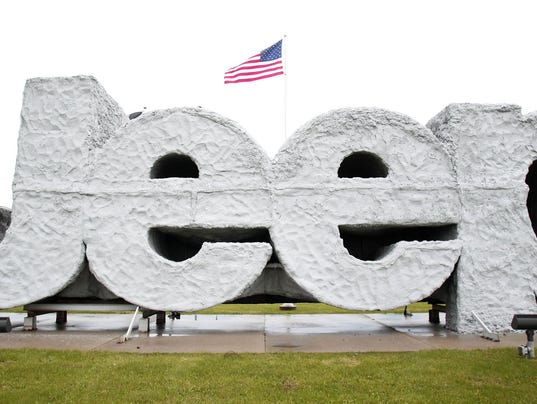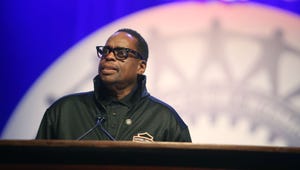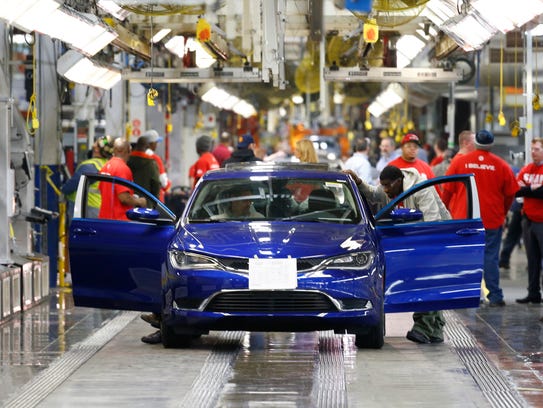Politico Magazine
A coalition of deep-pocketed liberal groups ― including a pair of super PACs backing Hillary Clinton ― has been meeting quietly for months, examining the 2016 map and plotting attacks against the powerful Koch brothers' network.
At midday Thursday, the architect of that effort, Clinton antagonist-turned-enforcer David Brock, is scheduled to present his findings ― complete with the back-up polling and research ― to the Senate Democratic Caucus, sources tell POLITICO.
Brock declined to comment for this story. But sources familiar with the caucus meeting plan say it appears his goal is to win strategic buy-in from Democratic Senators, who are looking for ways to make the most of a favorable 2016 electoral landscape.
Brock's argument, according to his recently released book and interviews with his allies, is that spotlighting the massive political spending of the conservative groups backed by the billionaire industrialists Charles and David Koch is a "critical component" of boosting Democratic candidates, including Clinton, in 2016.
While the strategy produced little tangible benefit for Democrats in the 2014 election, several Democratic Senators in interviews this week expressed support for recommitting to the attacks.
"Well, I'm going to continue talking about them," said Senate minority leader Harry Reid (D-Nev.), who has spearheaded the Democrats' war on the Kochs and invited Brock to the Capitol. Reid first reached out to Brock about the effort in 2014, according to Brock's book, which recounts a conversation in which Brock asked the senator "What should I be doing?"Since then, Brock's groups have invested heavily in providing ammunition for the Koch attacks. And Reid asserted the effort has publicly defined the billionaire brothers, whose network intends to spend $889 million shaping the political and public policy debate in the run-up to 2016.
"We've proven in the long run that they're interested in one thing: Their bottom line. They're trying to buy the country, they want to become America's oligarchs," said Reid, who before the 2014 election repeatedly took to the Senate floor to lambast the Kochs as poster children for the corrupting power of money in politics. The broadsides were supported by multi-million-dollar political advertising campaigns, many of them funded by unlimited money super PACs that got their research from American Bridge, a non-profit operation founded by Brock. The common theme was that GOP candidates were beholden to super-rich donors like the Kochs rather than the middleclass voters who tend to decide elections.
It didn't go so well.
Democrats lost nine Senate seats and, with them, control of the Senate, while Republicans also made gains in the House and state capitals around the country. And Reid faced criticism from across the political spectrum for attacking the Kochs. Even Reid's fellow Democrats questioned the efficacy of attacking a pair of little-known ― albeit hugely influential ― donors, arguing it detracted from Democrats' core messages about the plight of the middle class.
"How could you say it's effective? Look at the results. I think the American public wants a discussion on solutions," Sen. Heidi Heitkamp (D-N.D.), said Tuesday. "When you start making [the Kochs] front and center, you are losing sight of what you absolutely need to do," said Heitkamp, who does not face reelection until 2018. "We need to be more mindful of what the message is, not who the messengers are and who's paying for them."
James Davis, a spokesman for Freedom Partners Chamber of Commerce, the non-profit group that orchestrates the Koch network, accused Brock and Reid of pursuing a cynical ― and unsuccessful ― political ploy. "Their past attempts to divide America by demonizing job creators have failed," he said. "We remain focused on advancing free-market principles ― ending corporate welfare, reducing barriers to opportunity and restoring fiscal responsibility."
The Kochs' allies have pointed out that some of the Kochs' top policy goals ― like reforming criminal justice laws and eliminating the Export-Import Bank ― have little, if any, bearing on their family-owned multi-national industrial conglomerate, Koch Industries. And they've mocked Reid for his occasional diatribes against the Kochs, who he's accused of being one of the "main causes" of climate change, alleging it's all part of an effort to intimidate conservative donors from political participation.
The Koch brothers have defended their network's spending as driven by a desire to improve society by advancing free market policies, rather than Koch Industries' profits. And the company has spent heavily on ads touting its corporate citizenship and the 60,000 U.S. jobs it provides.
Democrats have interpreted that as a sign that their attacks are working.
Senate Minority Whip Dick Durbin (D-Ill.) asserted this week "The fact that the Koch brothers are spending a fortune on positive advertising about themselves is an indication that their reputation has suffered."
And Brock and his allies have argued that the 2014 efforts by Reid and his big-money super PAC allies laid the groundwork for the strategy to pay dividends in 2016, when Democrats will face a more promising landscape. They're defending only 10 Senate seats, compared to 24 for Republicans.
Sources familiar with the plan for Thursday's caucus meeting say Brock will be accompanied by the veteran Democratic pollster Geoff Garin, who works for both American Bridge and Priorities USA Action, a super PAC that plans to air millions of dollars of ads supporting Clinton's presidential campaign.
Garin, who has conducted focus groups for American Bridge on Koch-themed political messaging, has argued that the attacks on the Kochs in 2014 may have helped Democrats win one Senate race ― Democrat Gary Peters' victory over Republican Terri Lynn Land in Michigan ― and kept others close.
For Reid, who is not seeking reelection in 2016, the battle also is personal. His accusations ― among them that the Kochs are "un-American" ― have provoked personal responses from the Kochs and their allies.
At the Kochs' annual summer donor summit in 2014, organizers erected a life-sized cardboard cutout of Reid, his arms spread and his mouth agape as if in midspeech. Emanating from it was a cartoon-like quote bubble with the word "un-American." This summer, Charles Koch took a swipe at Reid, mentioning his "bad eye" ― an allusion to an exercise accident early this year that left Reid blind in one eye.
And the Koch network has been building a robust infrastructure in Nevada, which likely would have deployed against Reid had he sought another term. In particular, the Koch-backed LIBRE Initiative, which courts Latino voters, was plowing money into infrastructure in Reid's backyard. It could still make things tricky for Reid's preferred successor, Nevada Attorney General Catherine Cortez Masto, who is Latina.
LIBRE's efforts contributed to the defeat of two Latino Democrats in 2014, said Cristóbal J. Alex, president of the Latino Victory Project, a liberal advocacy group. It's working with Brock's groups to counter LIBRE's efforts in 2016.
"We don't want to be caught flatfooted like we were in 2014. We won't let our candidates be attacked without response," he said, adding that his group would highlight LIBRE's Koch funding, without attacking the Kochs directly.
Likewise, a liberal group that reaches out to veterans, VoteVets.org, has worked with Brock's coalition to counter the efforts of a Koch-backed group called Concerned Veterans for America.
"Every chance we get, we're going to talk about Concerned Veterans being financed by the Koch brothers, because we think it's important for people to know," said VoteVets President Jon Soltz. Additionally, he said "when I mention the Koch network to my email database, it raises money and it fires up my base." In fact, in a Tuesday email to his supporter list, he warned that "the Koch Brothers are funding a massive organization to replicate our efforts, but with a focus on privatizing veterans' health care. And they are very dangerous."
Beyond the electoral and fundraising components, Democrats say the focus on the Kochs can help generate momentum for campaign finance reform.
"The Koch brothers are symptoms of a bigger problem, and that is Citizens United … free speech means normal folks can get swamped out," said Sen. Claire McCaskill (D-Mo.).
Senate Dems meet to plot 2016 attacks on wealthy Koch brothers - POLITICO




